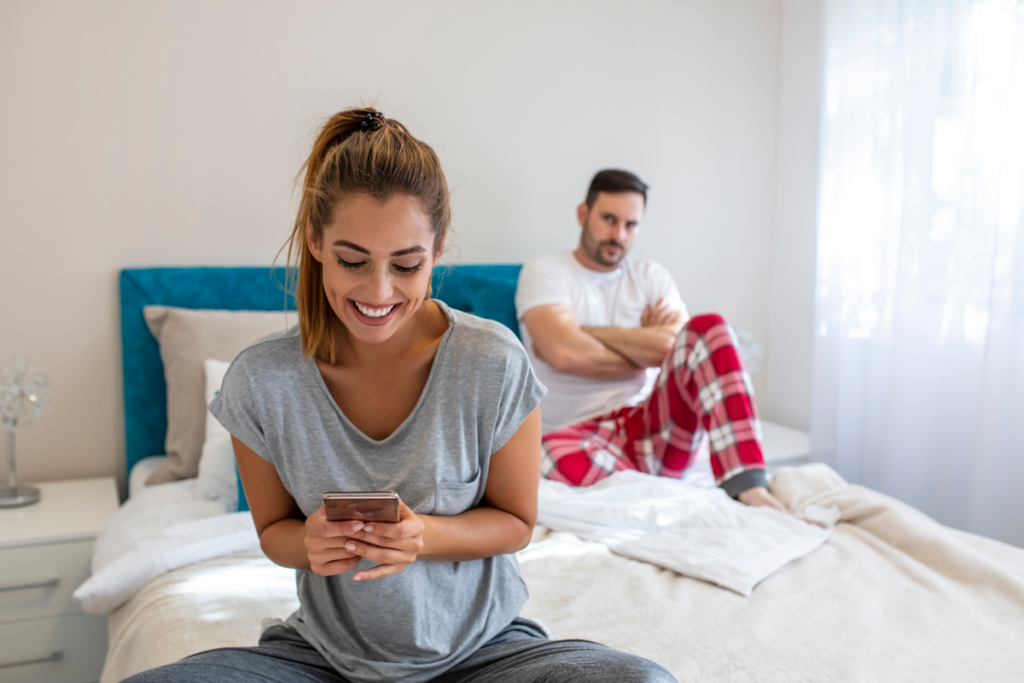What Can You Do if Your Partner Looks More at Their Cell Phone Than at You?

Technology has had a significant impact on the way people interact today. Even in the context of a relationship, the use of electronic devices can have a positive or negative influence. For example, it can help you to stay connected if you find yourselves having to maintain your relationship from a distance. However, it can also become a problem. For example, if your partner looks more at their cell phone than at you.
This situation may well cause arguments between you since, in effect, it means you’re being ignored. In fact, if you don’t take some kind of action, you may find that the conflict continues to escalate. It could even mean that, at some point, the relationship becomes untenable, leading to a breakup.
“Phubbing”: when your partner looks more at their cell phone than at you
Do you feel that your partner doesn’t pay any attention to you because they’re continually checking their cell phone? If so, you’re probably a victim of phubbing.
This is a combination of the words phone and snubbing. It’s used to highlight a specific phenomenon in communication when one party pays more attention to their cell phone than to a real-life conversation. As a matter of fact, this problem is becoming more and more common in today’s society, in which technology plays such an important role.
In this sense, phubbing can appear in a good number of situations. Furthermore, a study regarding cell phone use and partner satisfaction showed that phubbing decreases well-being. Those who reported higher levels of phubbing also felt less satisfied with their relationship. Likewise, the researchers observed more symptoms of stress, anxiety, and depression in them (González-Rivera, Segura-Abreu, and Urbistondo-Rodríguez, 2018).
Similarly, Ergün, Göksu, and Sakız (2020) conducted a study concerning the relationship of phubbing with certain psychometric variables. The researchers found that this behavior is positively associated with anxiety, depression, somatization, loneliness, and hostility.
If your partner looks more at their cell phone than at you, it’s advisable to take action. In this way, you’ll prevent this behavior from becoming something more serious than it was when it began. Remember, you can often avoid or escape from many crises if you act before they start to deteriorate.

What can you do?
Phubbing isn’t something that should be taken lightly. Indeed, both within the relationship and outside of it, this way of distributing attention has either directly or indirectly ended many relationships.
Therefore if you find this happening to you, it’s time to take action. Here are some ideas:
1. Talk to your partner
The first thing to do is to confront the situation in a calm way. Therefore, you need to have a conversation. However, make sure you choose the right time and place to explain how you feel about what’s happening. In fact, it’s best to have a face-to-face conversation in a quiet and intimate space where there are no distractions.
This conversation should help you identify some of the problems that you may not have noticed before. For example, you might discover that you’re stuck in a rut and that’s the cause of the problem. Or, perhaps your partner pays more attention to their cell phone in order to avoid communicating with you.
2. Agree to put the cell phone to one side
People often have a habit of engaging in parallel conversations when using a cell phone. In fact, they hear, yet don’t really listen, because they’re typing at the same time. Therefore they automatically answer one side of the conversation until they notice some kind of differential stimulus. Therefore, they completely lose certain details and nuances.
One way to avoid this is to leave their cell phone face down on the table or leave it in their jacket pocket or bag. Indeed, in face-to-face conversations, it’s always better if cell phones are switched off. In this way, communication problems will be avoided.
3. Limit the use of technology
Today, technology is present in almost all areas of human life. People tend to use their devices right up until bedtime. However, this can prove to be detrimental. For this reason, it’s essential to establish certain rules regarding the use of the Internet and cell phones.
One example would be agreeing with your partner not to bring electronic devices into the bedroom. It helps to keep in mind that your bedroom is an intimate space that you both share. Thus, looking at gadgets can ruin the important quality of intimacy in your relationship.
4. Arrange “screen-free” activities
Sometimes, boredom or routine can be a key factor in the appearance of communication difficulties. In this way, the solution would be to reserve moments you can share as a couple, without any technology being present.
This won’t only help with the problem of your partner looking more at their cell phone than at you, but it’ll also reinforce the bond between you. In fact, try and spend a few pleasant days doing something together that you both enjoy.

5. Consider going to therapy
Sometimes, there are deeper and more complicated reasons for certain problems within relationships. In these cases, the best way to proceed, if both parties agree, is to seek professional help. Indeed, couples therapists have resources and techniques that’ll allow you to explore any kind of conflict in your relationship.
In this sense, therapy would not only serve to address the practice of phubbing but would also be useful for any other issues. For example, you may have come to the conclusion that it’s time you clarified where you’re going as a couple.
Finally, keep in mind that if your partner looks more at their cell phone than at you, you certainly shouldn’t be tempted to underestimate yourself in any way. Indeed, there’s an unfortunate tendency for people to often think that this kind of problem originates from the fact that they’re no longer attractive enough for their partner. However, if you find yourself experiencing these kinds of thoughts, you must reflect on your self-esteem as well as how you perceive yourself.
Technology has had a significant impact on the way people interact today. Even in the context of a relationship, the use of electronic devices can have a positive or negative influence. For example, it can help you to stay connected if you find yourselves having to maintain your relationship from a distance. However, it can also become a problem. For example, if your partner looks more at their cell phone than at you.
This situation may well cause arguments between you since, in effect, it means you’re being ignored. In fact, if you don’t take some kind of action, you may find that the conflict continues to escalate. It could even mean that, at some point, the relationship becomes untenable, leading to a breakup.
“Phubbing”: when your partner looks more at their cell phone than at you
Do you feel that your partner doesn’t pay any attention to you because they’re continually checking their cell phone? If so, you’re probably a victim of phubbing.
This is a combination of the words phone and snubbing. It’s used to highlight a specific phenomenon in communication when one party pays more attention to their cell phone than to a real-life conversation. As a matter of fact, this problem is becoming more and more common in today’s society, in which technology plays such an important role.
In this sense, phubbing can appear in a good number of situations. Furthermore, a study regarding cell phone use and partner satisfaction showed that phubbing decreases well-being. Those who reported higher levels of phubbing also felt less satisfied with their relationship. Likewise, the researchers observed more symptoms of stress, anxiety, and depression in them (González-Rivera, Segura-Abreu, and Urbistondo-Rodríguez, 2018).
Similarly, Ergün, Göksu, and Sakız (2020) conducted a study concerning the relationship of phubbing with certain psychometric variables. The researchers found that this behavior is positively associated with anxiety, depression, somatization, loneliness, and hostility.
If your partner looks more at their cell phone than at you, it’s advisable to take action. In this way, you’ll prevent this behavior from becoming something more serious than it was when it began. Remember, you can often avoid or escape from many crises if you act before they start to deteriorate.

What can you do?
Phubbing isn’t something that should be taken lightly. Indeed, both within the relationship and outside of it, this way of distributing attention has either directly or indirectly ended many relationships.
Therefore if you find this happening to you, it’s time to take action. Here are some ideas:
1. Talk to your partner
The first thing to do is to confront the situation in a calm way. Therefore, you need to have a conversation. However, make sure you choose the right time and place to explain how you feel about what’s happening. In fact, it’s best to have a face-to-face conversation in a quiet and intimate space where there are no distractions.
This conversation should help you identify some of the problems that you may not have noticed before. For example, you might discover that you’re stuck in a rut and that’s the cause of the problem. Or, perhaps your partner pays more attention to their cell phone in order to avoid communicating with you.
2. Agree to put the cell phone to one side
People often have a habit of engaging in parallel conversations when using a cell phone. In fact, they hear, yet don’t really listen, because they’re typing at the same time. Therefore they automatically answer one side of the conversation until they notice some kind of differential stimulus. Therefore, they completely lose certain details and nuances.
One way to avoid this is to leave their cell phone face down on the table or leave it in their jacket pocket or bag. Indeed, in face-to-face conversations, it’s always better if cell phones are switched off. In this way, communication problems will be avoided.
3. Limit the use of technology
Today, technology is present in almost all areas of human life. People tend to use their devices right up until bedtime. However, this can prove to be detrimental. For this reason, it’s essential to establish certain rules regarding the use of the Internet and cell phones.
One example would be agreeing with your partner not to bring electronic devices into the bedroom. It helps to keep in mind that your bedroom is an intimate space that you both share. Thus, looking at gadgets can ruin the important quality of intimacy in your relationship.
4. Arrange “screen-free” activities
Sometimes, boredom or routine can be a key factor in the appearance of communication difficulties. In this way, the solution would be to reserve moments you can share as a couple, without any technology being present.
This won’t only help with the problem of your partner looking more at their cell phone than at you, but it’ll also reinforce the bond between you. In fact, try and spend a few pleasant days doing something together that you both enjoy.

5. Consider going to therapy
Sometimes, there are deeper and more complicated reasons for certain problems within relationships. In these cases, the best way to proceed, if both parties agree, is to seek professional help. Indeed, couples therapists have resources and techniques that’ll allow you to explore any kind of conflict in your relationship.
In this sense, therapy would not only serve to address the practice of phubbing but would also be useful for any other issues. For example, you may have come to the conclusion that it’s time you clarified where you’re going as a couple.
Finally, keep in mind that if your partner looks more at their cell phone than at you, you certainly shouldn’t be tempted to underestimate yourself in any way. Indeed, there’s an unfortunate tendency for people to often think that this kind of problem originates from the fact that they’re no longer attractive enough for their partner. However, if you find yourself experiencing these kinds of thoughts, you must reflect on your self-esteem as well as how you perceive yourself.
All cited sources were thoroughly reviewed by our team to ensure their quality, reliability, currency, and validity. The bibliography of this article was considered reliable and of academic or scientific accuracy.
- Abeele, M. M. V., Hendrickson, A. T., Pollmann, M. M., & Ling, R. (2019). Phubbing behavior in conversations and its relation to perceived conversation intimacy and distraction: An exploratory observation study. Computers in Human Behavior, 100, 35-47.
- González-Rivera, J., Segura-Abreu, L., & Urbistondo-Rodríguez, V. (2018). Phubbing en las relaciones románticas: Uso del celular, satisfacción en la pareja, bienestar psicológico y salud mental. Interacciones, 81-91.
- Ergün, N., Göksu, İ., & Sakız, H. (2020). Effects of phubbing: Relationships with psychodemographic variables. Psychological reports, 123(5), 1578-1613.
This text is provided for informational purposes only and does not replace consultation with a professional. If in doubt, consult your specialist.







